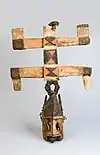Akan religion
Akan religion comprises the traditional beliefs and religious practices of the Akan people of Ghana and eastern Ivory Coast. Akan religion is referred to as Akom (from the Twi word akom, meaning "prophecy"). Although most Akan people have identified as Christians since the early 20th century, Akan religion remains practiced by some and is often syncretized with Christianity. The Akan have many subgroups (including the Fanti, Ashanti, the Akuapem, the Wassa, the Abron, the Anyi, and the Baoulé, among others), so the religion varies greatly by region and subgroup. Similar to other traditional religions of West and Central Africa such as West African Vodun, Yoruba religion, or Odinani, Akan cosmology consists of a senior god who generally does not interact with humans and many gods who assist humans.
| Part of a series on |
| Traditional African religions |
|---|
 |
|

Anansi the spider is a folk hero who is prominent in Ashanti folktales where he is depicted as a wise trickster. In other aspects of Akan spirituality, Anansi is also sometimes considered both a trickster and a deity associated with wisdom, responsible for creating the first inanimate humans, according to the scholar Anthony Ephirim-Donkor.[1] This is similar to Legba, who is also both a trickster and a deity in West African Vodun.[2]
Deities
Creator god
Followers of Akan spirituality believe in a supreme god who created the universe. He is distant and does not interact with humans.
The creator god takes on different names depending upon the region of worship, including Nyame, Nyankopon, Brekyirihunuade ("Almighty"), Odomankoma ("infinite inventor"),[3] Ɔbɔadeɛ ("creator") and Anansi Kokuroko ("the great designer" or "the great spider").[4] It is occasionally said that the creator god is a part of a triune deity or triad, which consists of Nyame, Nyankopon, and Odomankoma.[5]
The supreme creator is an omniscient, omnipotent sky father. His wife is Asase Yaa (also known as Mother Earth), considered second to God.[6] Together they brought forth two children: Bia and Tano.[7]
Abosom
The abosom, the lower deities or spirits, assist humans on earth. These are akin to orishas in Yoruba religion, the vodun in West African Vodun and its derivatives, and the alusi in Odinani. Abosom receive their power from the creator god and are most often connected to the world as it appears in its natural state. Priests serve individual abosom and act as mediators between the abosom and mankind. Many of those who believe in these traditions participate in daily prayer, which includes the pouring of libations as an offering to both the ancestors who are buried under the land and to the spirits who are everywhere.
Nsamanfo
The Nsamanfo are the ancestors. They are sometimes referred to as ghosts.
In the Americas
Jamaica
According to Long, Akan (then referred to as "Coromantee") culture obliterated any other African customs and incoming non-Akan Africans had to submit to the culture of the majority Akan population in Jamaica, much like a foreigner learning migrating to a foreign country. Other than Ananse stories, Akan religion made a huge impact. The Akan pantheon of gods referred to as Abosom in Twi were documented. Enslaved Akan would praise Nyankopong (erroneously written by the British as Accompong, not related to the Maroon leader Accompong [Twi: Akyeampong]); libations would be poured to Asase Yaa (erroneously written as 'Assarci') and Epo the sea god. Bonsam was referred to as the god of evil.[8] Kumfu (from the word Akom the name of the Akan spiritual system) was documented as Myal and originally only found in books, while the term Kumfu is still used by Jamaican Maroons. The priest of Kumfu was called a Kumfu-man.[9]
The Jamaican Maroon spirit-possession language, a creolized form of Akan, is used in religious ceremonies of some Jamaican Maroons.
Myal and Revival
Kumfu evolved into Revival, a syncretic Christian sect. Kumfu followers gravitated to the American Revival of 1800 Seventh Day Adventist movement because it observed Saturday as god's day of rest. This was a shared aboriginal belief of the Akan people as this too was the day that the Akan god, Nyame rested after creating the earth. Jamaicans that were aware of their Ashanti past while wanting to keep hidden, mixed their Kumfu spirituality with the American Adventists to create Jamaican Revival in 1860. Revival has two sects: 60 order(or Zion Revival, the order of the heavens) and 61 order(or Pocomania, the order of the earth). 60 order worships God and spirits of air or the heavens on a Saturday and considers itself to be the more 'clean' sect. 61 order more deals with spirits of the earth. This division of Kumfu clearly shows the dichotomy of Nyame and Asase Yaa's relationship, Nyame representing air and has his 60 order'; Asase Yaa having her 61 order of the earth. Also the Ashanti funerary/war colours: red and black have the same meaning in Revival of vengeance.[10] Other Ashanti elements include the use of swords and rings as means to guard the spirit from spiritual attack. The Asantehene like the Mother Woman of Revival, has special two swords used to protect himself from witchcraft called an Akrafena or soul sword and a Bosomfena or spirit sword[11][12]
Suriname
Winti is an Afro-Surinamese religion which is largely derived from both Akom and Vodun with Vodun gods such as Loco, Ayizu and so on.[13]
Haiti
Haitian Vodou is a syncretic religion that combines Vodun with several other African religions in addition to influences from Catholicism. Here latent influences of Akan beliefs can be seen in the incorporation of Anansi as one of the Lwa worshiped in the Haitian religion. He is often depicted as maintaining the connection between the living and their deceased ancestors.[14]
References
- Ephirim-Donkor, Anthony. "African Personality and Spirituality: The Role of Abosom and Human Essence". Lexington Books, 2015: pp. 80.
- Herskovits, Melville J. and Frances S. "Dahomean Narrative: A Cross-Cultural Analysis." Northwestern University Press (1958), p 35.
- Sykes & Kendall 2001, p. 146.
- "Archived copy". Archived from the original on 18 May 2014. Retrieved 1 May 2014.CS1 maint: archived copy as title (link)
- Lynch 2010, p. 93.
- Opokuwaa, Nana Akua Kyerewaa (1 January 2005). The Quest for Spiritual Transformation: Introduction to Traditional Akan Religion, Rituals and Practices. iUniverse. ISBN 9780595350711.
- Lynch 2010, p. 94.
- Long, Edward (1774). "The History of Jamaica Or, A General Survey of the Antient and Modern State of that Island: With Reflexions on Its Situation, Settlements, Inhabitants, Climate, Products, Commerce, Laws, and Government" (google). 2 (3/4): 445–475. Cite journal requires
|journal=(help) - Gardner, William James (1909). History of Jamaica, From Its Discovery To The Year 1872. Appleton & Company. p. 184. ISBN 978-0415760997.
- Allenye, Mervyn C. (2004). Jamaican Folk Medicine: A Source of Healing. University of the West Indies Press. p. 36. ISBN 9789766401238.
- "Running to Mother-Thugs Seek Guard Rings and Divine Protection". Jamaica Gleaner. 19 September 2010.
- "British Museum - I.v".
- Rijksuniversiteit te Utrecht Center for Latin American and Caribbean Studies (1979). Nieuwe West-Indische gids. 53–55. Nijhoff. p. 14.
- DeLoughrey, Elizabeth; Handley, George B. "Postcolonial Ecologies: Literatures of the Environment". New York: Oxford University Press, Inc., 2011: pp. 74.
Sources/ further reading
- Olson, James Stuart (1996). The peoples of Africa: an ethnohistorical dictionary. Santa Barbara, CA: Greenwood Press. p. 18. ISBN 978-0-313-27918-8.
- Sykes, Egerton; Kendall, Alan (2001). Who's who in non-classical mythology. Routledge. ISBN 978-0-415-26040-4.CS1 maint: ref=harv (link)
- Forde, Cyril Daryll (1954), African Worlds: Studies in the Cosmological Ideas and Social Values of African Peoples, James Currey Publishers, ISBN 9780852552810
- Lynch, Patricia Ann (2010), African Mythology, A to Z, Infobase Publishing, ISBN 9781438131337
- Ephirim-Donkor, Anthony. African Personality and Spirituality: The Role of Abosom and Human Essence. Lexington Books, 2015 ISBN 978-1498521222
- Opokuwaa, Nana Akua Kyerewaa. (2005-01-01). The Quest for Spiritual Transformation: Introduction to Traditional Akan Religion, Rituals and Practices. iUniverse. ISBN 9780595350711